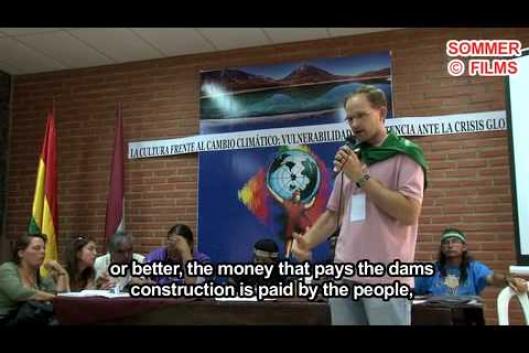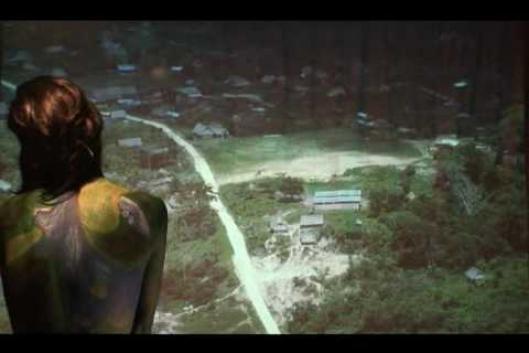Africa is fast becoming the Promised Land for emerging powers –as in the cases of Brazil, China and India- trying to outcompete the old colonial powers in the scramble for the riches of this continent. At the same time other comparatively less powerful countries –such as Saudi Arabia, Qatar, Kuwait, South Korea, Finland and others- are grabbing whatever they can –farmland, forests, carbon markets, cheap labour- in the spaces left unoccupied by the former.
Issue 154 – May 2010
World People’s Conference: Climate Change and Rights of Mother Earth
WRM Bulletin
154
May 2010
OUR VIEWPOINT
WORLD PEOPLE’S CONFERENCE: CLIMATE CHANGE AND RIGHTS OF MOTHER EARTH
-
20 August 2010Several weeks have passed since the World Peoples’ Conference on Climate Change and the Rights of Mother Earth, convened by Bolivian President Evo Morales. But in these times of fast-moving and disposable news, we should make an effort to ensure that the crucial significance of this meeting is not simply tossed on the junk news heap. While it was underway, the biggest media coverage given to the conference focused on the indigenous president’s remarks about female hormones in chickens, comments which were misinterpreted or perhaps poorly expressed.
-
30 May 2010By convening the World People’s Conference on Climate Change and the Rights of Mother Earth, the plurinational government of Bolivia set the stage for a transcendental political event: social movements representing an extraordinary range of sectors collectively formulated a unified agenda of their own, with a radical stance towards climate change – radical because it focused on the root of the problem.
-
30 May 2010An analysis of Peoples’ Agreement (1) that emerged from the World People’s Conference on Climate Change and the Rights of Mother Earth, held from 20 to 22 April in Cochabamba (Bolivia) may lead us to think that the gender issue was not present at that Conference.
-
30 May 2010Letter from Uruguayan writer Eduardo Galeano, read at the opening ceremony of the World People’s Conference on Climate Change and the Rights of Mother Earth: The World People’s Conference on Climate Change and the Rights of Mother Earth starts today in Cochabamba, Bolivia, convened by Bolivia’s President Evo Morales.
COMMUNITIES AND FORESTS
-
20 August 2010Norway is a major donor of the Amazon Fund, the Brazilian Development Bank’s fund that receives donations from governments, multilateral institutions, big NGOs and companies to fund forest conservation projects with the alleged aim of reducing emissions of greenhouse gases resulting from deforestation. The contribution of donors is recognised with diplomas that are nominal, non-transferable and do not imply equity rights or carbon credits to offset.
-
30 May 2010Guatemala is facing the possibility of an extension of contract 2-85 that is threatening to expand and increase the oil frontier in one of its most important natural areas, the Laguna del Tigre national park This is the country’s biggest national park and the core area of the Maya Biosphere Reserve, classified under that protection category in 1990 because of its international ecological importance.
COMMUNITIES AND TREE MONOCULTURES
-
30 May 2010Concerns have been raised in Kenya about the high water consumption of eucalyptus trees, which in 2009 led the country’s Environment Minister, John Michuki, to order the uprooting of eucalyptus trees from wetlands and banned their planting along rivers and watersheds. WRM welcomed this move and provided an overview on this issue in WRM bulletin 147 (October 2009).
-
30 May 2010Asia Pulp and Paper (APP) is one of the most controversial and destructive paper companies on the planet. The company has cleared vast areas of rainforest to feed its two million tonnes-a-year pulp mill in Sumatra, Indonesia. APP is constantly expanding. In September 2007, Vietnam Investment Review reported that APP was considering building a two million tonnes-a-year pulp mill in Vietnam. While this plan has so far not progressed, APP seems to be moving into Vietnam through a company called Green Elite.
-
30 May 2010The government of Mozambique is in the process of expanding large-scale monocultures of alien, fast-growing tree species, mainly eucalyptus, pine and teak trees in the northern part of the country. In November 2009, Winfridus Overbeek, member of the Alert against the Green Desert Network and Domingos Firmiano dos Santos, Afrobrazilian (quilombola) community leader of Angelim and national leader of CONAQ (Coordenação Nacional das Comunidades Quilombolas – National Coordination of Afrobrazilian Communities), made a field visit to Mozambique.
-
30 May 2010In August 2009, the International Finance Corporation (IFC), and shortly thereafter the wider World Bank Group (WBG) of which it is part suspended finance for the palm oil sector. This was done in response to critical complaints by Indonesian NGOs and indigenous peoples’ organizations and international NGOs which triggered a damning audit report by the IFC’s own Compliance Advisory Ombudsman.


